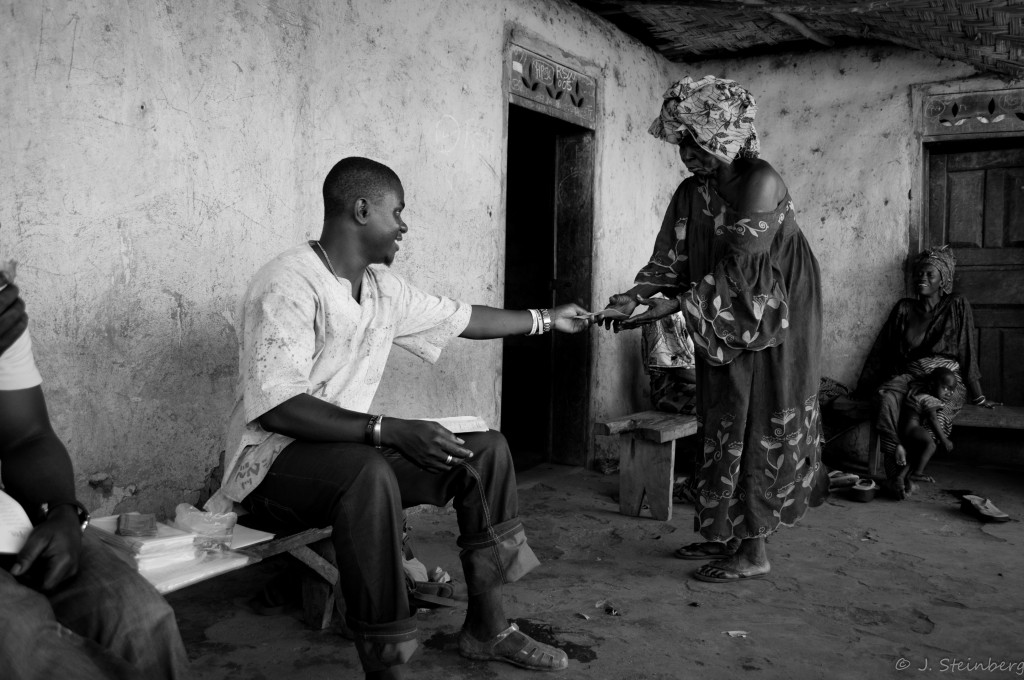Guest post by Jeff Mosenkis of Innovations for Poverty Action.
- In a new study in Science today Cilliers, Dube, & Siddiqi examine the effects of a post civil-war reconciliation program in Sierra Leone. The design of the program is a common one, where people involved on all sides of the conflict come together in their villages to talk about what they did or experienced, hopefully culminating in forgiving. Tracking people in 200 villages which were randomly assigned to the program or not for over two years, they found that it did increase forgiveness and social ties, but also increased psychological trauma for those who participated. Rachel Glennerster co-authored an accompanying piece in Science and reviews the research for the Monkey Cage, the Science articles will also be free with registration to everybody for the next two weeks, links at the IPA summary.
- In an excellent and non-technical post, David Evans asks Why don’t economists do cost analysis in their impact evaluations? If the point is to know which programs should be expanded, shouldn’t the price tag be part of the basic information? The Economist (the publication, not Evans) has an article you’d think would be well-received about the Copenhagen Consensus’ ranking of returns per dollar spent on different programs, but in a nice discussion on twitter today, Justin Sandefur and Rachel Glennerster point out they mix studies of very different quality.
- Evidence Action announced this week they were going to be broadening one of the interventions on that list from Bangladesh, ‘No lean season.’ Many areas dependent on farming around the world run out of food from the last harvest before the new harvest comes in, leading to a hunger season. But in Bangladesh, previous research has found a bit of cash or credit (as low as $8) to help a family member travel to find seasonal work in a city increases income and food intake for the whole family. Evidence Action hopes to reach 310,000 low-income households in Northern Bangladesh in the next four years.
- Last Sunday Germany had so much renewable energy prices went negative, meaning they had to pay people to use electricity.
- The Indian government is trying to consolidate 200 government functions (such as passport applications, taxes, utility bills, and land titles) into a phone app to make them more accessible and less vulnerable to corruption.
It felt like all of the 9,000 people we follow on twitter have been talking about John Oliver’s episode on how scientific studies get overblown in the media. It’s worth watching till the bit at the end. Then go read the Washington Post article from a couple days later about how Tylenol reduces empathy (headline: “This popular painkiller also kills kindness”).


11 Responses
Last Sunday Germany had so much renewable energy prices went negative, meaning they had to pay people to use electricity.
golu dolls
golu dolls
IPA’s weekly links: Guest post by Jeff Mosenkis of Innovations for Poverty Action. In a new study in Science … https://t.co/TvnxAFtCSh
RT @cblatts: IPA’s weekly links https://t.co/prbovrY0Ly
RT @cblatts: IPA’s weekly links https://t.co/prbovrY0Ly
RT @poverty_action: .@cblatts links- new post-war reconciliation research & why are economists so bad at prices? https://t.co/1wdvJSYQl5 ht…
RT @cblatts: IPA’s weekly links https://t.co/prbovrY0Ly
RT @cblatts: IPA’s weekly links https://t.co/prbovrY0Ly
RT @poverty_action: The @washingtonpost headline from this week that could ruin your relationships! https://t.co/QcZJEBaGjW
The @washingtonpost headline from this week that could ruin your relationships! https://t.co/QcZJEBaGjW
RT @cblatts: IPA’s weekly links https://t.co/prbovrY0Ly
.@cblatts links- new post-war reconciliation research & why are economists so bad at prices? https://t.co/1wdvJSYQl5 https://t.co/vSmpMopTbG